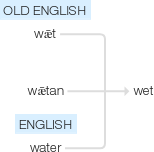Wet
Old English wǣt (adjective and noun), wǣtan (verb); related to water.
wiktionary
From Middle English wet(“wet, moistened”), wett, wette, past participle of Middle English weten(“to wet”), from Old English wǣtan(“to wet, moisten, water”), from Proto-Germanic *wētijaną(“to wet, make wet”), from Proto-Indo-European *wed-(“water, wet”) (also the source of water).
Cognate with Scots weit, wete(“to wet”), Saterland Frisian wäitje(“to wet; drench”), Icelandic væta(“to wet”). Compare also Middle English weet(“wet”), from Old English wǣt(“wet, moist, rainy”), from Proto-Germanic *wētaz(“wet, moist”), related to Scots weit, weet, wat(“wet”), North Frisian wiat, weet, wäit(“wet”), Saterland Frisian wäit(“wet”), West Frisian wiet(“wet”), Swedish and Norwegian våt(“wet”), Danish våd(“wet”), Faroese vátur(“wet”), Icelandic votur(“wet”).
etymonline
wet (adj.)
Old English wæt "moist, rainy, liquid," also as a noun. "moisture, liquid drink," from Proto-Germanic *wed- (source also of Old Frisian wet ). Also from cognate Old Norse vatr; all from PIE root *wed- (1) "water; wet." Of paint, ink, etc., "not yet dry" from 1510s. Opposed to dry in reference to the U.S. battles over prohibition from 1870. Wet blanket "person who has a dispiriting effect" is recorded from 1871, from use of blankets drenched in water to smother fires (the phrase is attested in this literal sense from 1660s).
Do we not know them, those wet blankets who come down on our pleasant little fires and extinguish them, with no more ruth than the rain feels when it pours on the encampment of the merry picnic party, or floods the tents of a flower show? ["Wet Blankets," in Godey's Lady's Book and Magazine, February, 1871]
All wet "in the wrong" is recorded from 1923, American English; earlier simply wet "ineffectual," and perhaps ultimately from slang meaning "drunken" (c. 1700). Wet-nurse is from 1610s. The diver's wet-suit is from 1955. Wet dream is from 1851; in the same sense Middle English had ludificacioun "an erotic dream."
He knew som tyme a man of religion, þat gaff hym gretelie vnto chastitie bothe of his harte & of his body noghtwithstondyng he was tempid with grete ludificacions on þe nyght. ["Alphabet of Tales," c. 1450]
wet (v.)
Old English wætan "to wet, moisten, water; be or become wet;" see wet (adj.). From mid-15c. as "to intoxicate" (oneself). Meaning "urinate" is by 1925. Related: Wetted; wetting.
wet (n.)
Old English wæt (see wet (adj.)).
